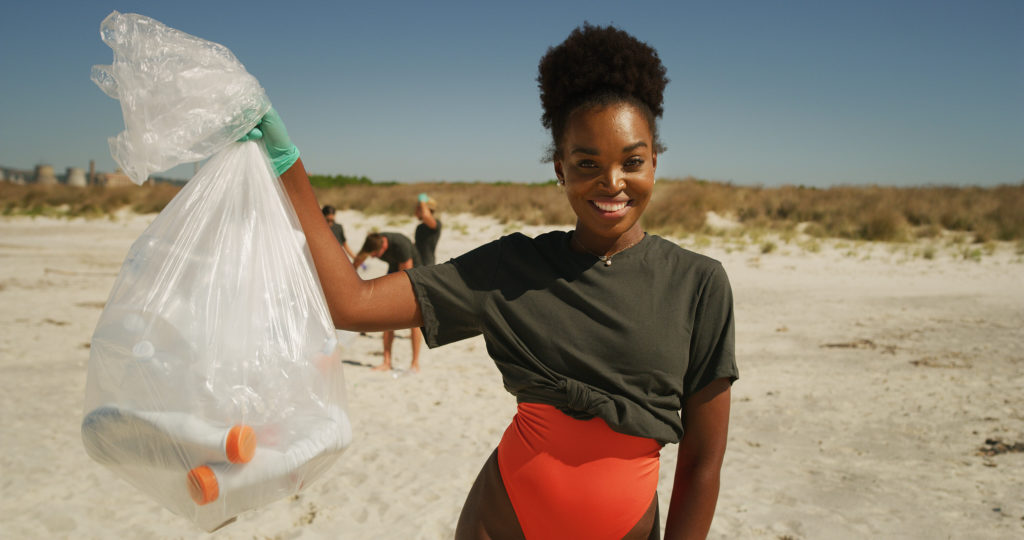Everything You Need To Know About Trash In Our Waterways
August 30, 2021

Orange County’s waterways are some of our most prized possessions. Trash that is not disposed of properly negatively impacts water quality, damages ecosystems, and harms aquatic and human life. How does this happen? Since stormwater is not treated, trash from inland and coastal areas that enters the storm drain system is transported to our waterways and eventually the ocean. This makes the cleanup events held throughout Orange County tremendously important to protecting our water resources. With September being Coastal Cleanup Month and September 18th being Coastal Cleanup Day, now is a great time to consider participating in a cleanup event near you. Both coastal and inland sites are available so that no matter where you live, you can help keep our waterways sparkling.
Common Trash Items
Did you know that 80% of trash in our waterways comes from land-based sources? According to the California Coastal Commission’s data, the top ten items picked-up from 1988-2017 were:
- Cigarettes/cigarette filters
- Food wrappers/containers
- Caps/lids
- Bags (paper and plastic)
- Cups/plates/utensils
- Straws/stirrers
- Glass beverage bottles
- Plastic beverage bottles
- Beverage cans
- Construction materials
In fact, cigarettes/cigarette filters, food wrappers/containers, and caps/lids made up over 50% of items collected. By properly disposing of your trash, aquatic life and ecosystems are better protected, beaches are cleaner, water quality is improved, and waterway closures are prevented.
Main Sources of Waterway Trash
Both unintentional and intentional littering harm our waterways, community health, climate, and threaten our way of life.
- Unintentional Littering: The wind can unintentionally blow trash out of vehicles, improperly closed garbage and recycling bins, people’s pockets, and more. This is most likely to happen to lightweight items like plastic bags and food wrappers. To prevent unintentional littering, check out the “What You Can Do” section of this blog.
- Intentional Littering: This less prevalent source of waterway pollution occurs when people intentionally throw trash out of their car window, on the ground, don’t clean up after themselves while outdoors, or take other deliberate actions to litter.
What You Can Do
No matter the intention, if trash gets in our storm drains it will travel to our waterways. That’s why it is important to stop trash at the source. Here’s what you can do:
- Place trash in a covered bin.
- Keep a portable trash can in your car to prevent light weight items from blowing out your window.
- When driving in a pickup truck, secure all loads and use a tarp to keep light weight items contained.
- While enjoying Orange County’s many outdoor spaces, practice the “pack it in, pack it out” principle.
These quick and easy actions can prevent a tremendous amount of trash from reaching our waterways, just by themselves! However, if trash does get into the environment, that is where cleanups come in. By participating, you can help to remove trash from our channels and/or beaches and keep it from reaching our waterbodies.
How You Can Get Involved
All the land in Orange County drains to at least one body of water (stream, creek, river, bay) on its way to the Pacific Ocean. Whether you live in a coastal community like Dana Point or an inland neighborhood like Yorba Linda, it’s critical to keep trash out of our storm drains. Coastal Cleanup Day is on Saturday, September 18th, 2021, from 9:00 A.M to noon. Visit the Orange County Coastkeeper page to find the nearest cleanup site to you. With over thirty coastal and inland sites across all of Orange County, along with a month-long virtual cleanup event you can do in your own neighborhood, there are plenty of ways to get involved!
Your efforts don’t have to be limited to September 18th either. Visit our events calendar for information on other cleanup events throughout the year.
For more information on trash and things you can do every day to prevent stormwater pollution, check out our Pollution Prevention For Residents page.
Remember, YOU are the solution to stormwater pollution.